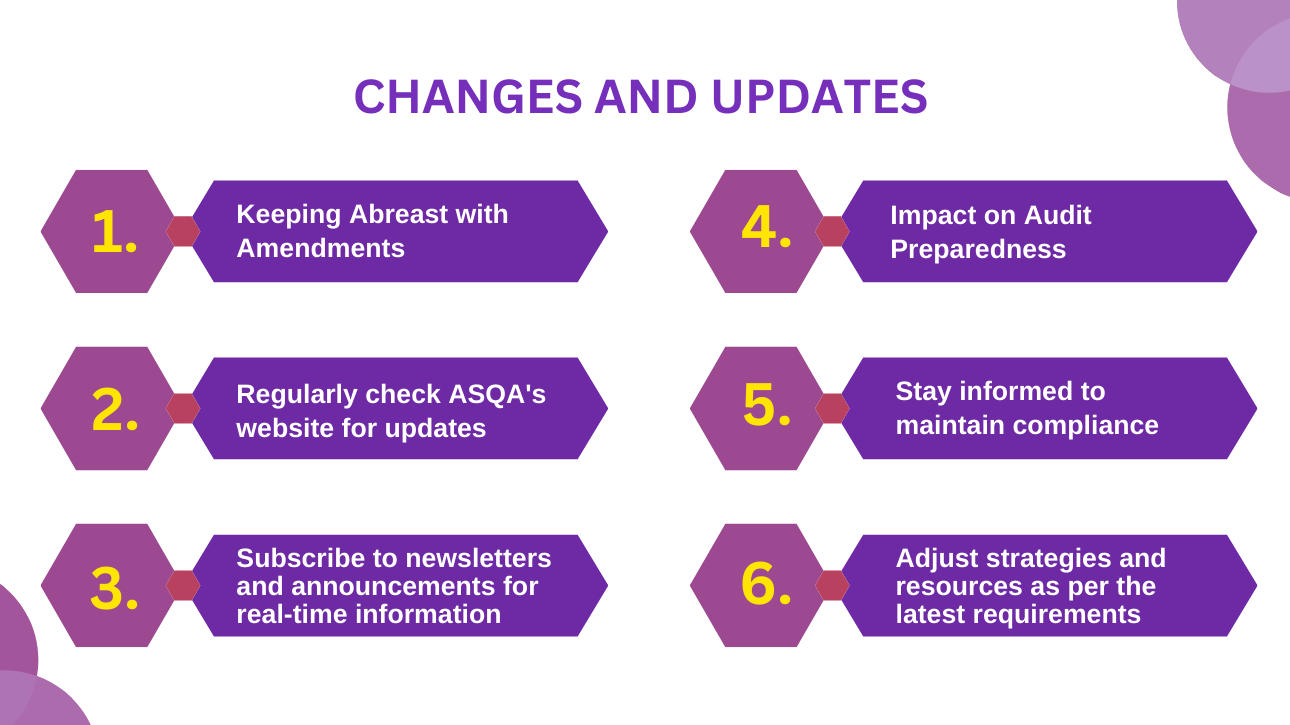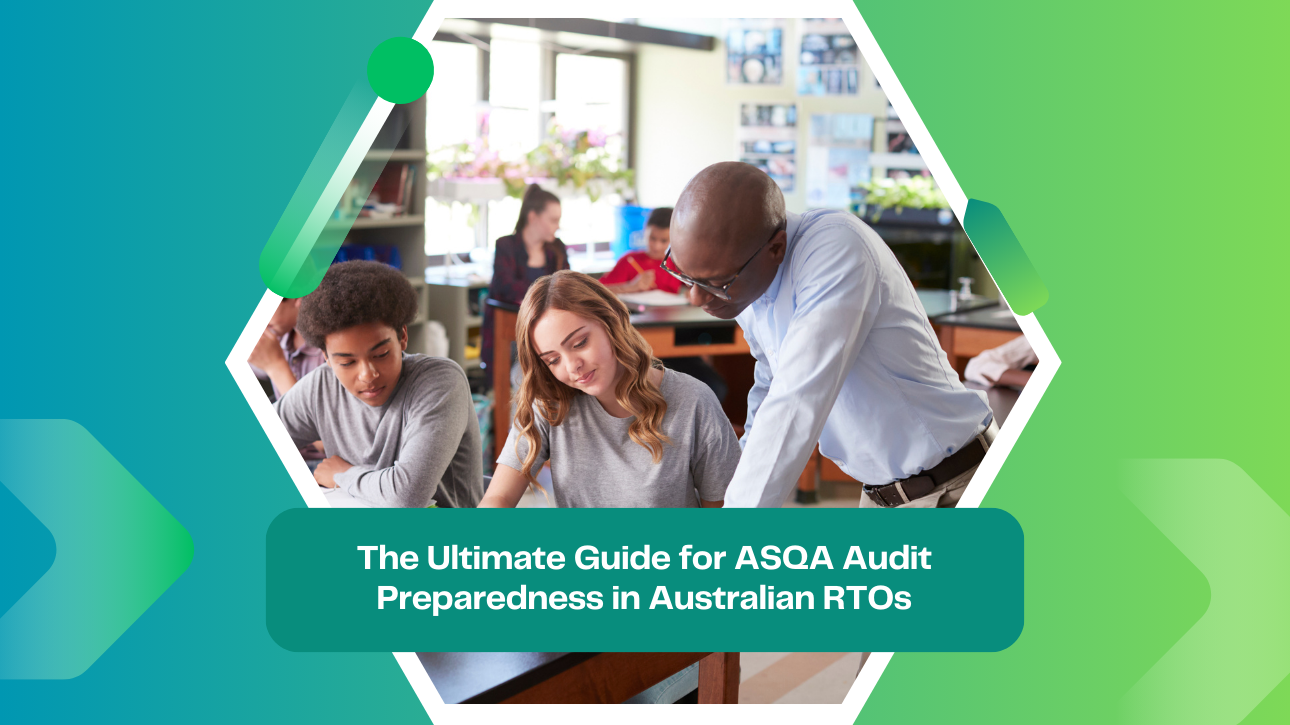Introduction
Navigating the world of the Australian Skills Quality Authority (ASQA) can be daunting for any Registered Training Organisation (RTO). This Ultimate Guide, explicitly tailored for RTOs, offers essential insights into achieving impeccable standards, especially the pivotal Standards for RTOs 2015. Maintaining these standards within the Australian Qualifications Framework isn’t just about ticking boxes; it’s about ensuring students receive the finest infection control training and other valuable courses.
As we dive deeper, this guide aims to clarify frequently asked questions and arm you with a thorough RTO registration checklist. Beyond mere compliance, it’s about upholding a gold standard in education and ensuring your establishment stands out in Australia’s rich educational landscape. So, whether you’re an RTO veteran or new, let’s embark on this journey towards ASQA audit excellence together.
Understanding the Standards for RTOs 2015
This section demystifies the Standards for RTOs 2015, a cornerstone for any Registered Training Organisation aiming for excellence in the Australian educational sector.
Overview of the Standards
- Importance and Application
- Establishes benchmarks for quality education
- Ensures alignment with the Australian Qualifications Framework
- Fundamental for offering courses like infection control training
- Key Components and Requirements
- Training and assessment strategies
- Adequate resources and facilities
- Qualified trainers and assessors
- Student support and progression
Navigating the User’s Guide
- Using the Guide to Understand Standards
- Simplifies complex clauses
- Offers practical examples and scenarios
- Essential resource for addressing frequently asked questions
- Interpreting the Clauses
- Break down each clause into manageable parts
- Cross-reference with relevant legislation and guidelines
- Consult ASQA’s User Guide for clarification and additional information
Changes and Updates

- Keeping Abreast with Amendments
- Regularly check ASQA’s website for updates
- Subscribe to newsletters and announcements for real-time information
- Impact on Audit Preparedness
- Stay informed to maintain compliance
- Adjust strategies and resources as per the latest requirements
Understanding and implementing the Standards for RTOs 2015 is non-negotiable. It’s your ticket to ensuring your educational programs’ quality, credibility, and ongoing success.
Preparing for the ASQA Audit
Embarking on the journey of ASQA audit preparedness is essential for every Registered Training Organisation. This section provides a succinct yet comprehensive blueprint to ensure your RTO is well-prepared.
Importance of Preparedness
- Benefits of Being Prepared
- Smooth audit process
- Enhanced reputation and credibility
- Assurance of compliance with the Standards for RTOs 2015
- Consequences of Unpreparedness
- Potential sanctions
- Loss of reputation
- The strain on resources and operations
Developing an Audit Preparation Plan
- Identifying Areas of Focus
- Review standards and criteria
- Assess previous audit findings
- Prioritise high-risk areas
- Allocating Resources and Responsibilities
- Assign tasks to appropriate team members
- Ensure adequate resources for infection control training
- Set timelines and monitor progress
Gathering and Reviewing Evidence
- Types of Evidence
- Training and assessment records
- Student feedback and testimonials
- Documentation of resources and facilities
- Ensuring Compliance with Standards
- Cross-check evidence against Standards for RTOs 2015
- Address discrepancies promptly
- Consult ASQA guidelines for specific requirements
Addressing Non-compliances
- Identifying and Rectifying Issues
- Conduct internal audits
- Develop and implement corrective action plans
- Document all rectification efforts

Navigating the ASQA Audit Process
Navigating the ASQA audit process requires a thorough understanding and strategic approach. In this section, we’ll guide you through each phase to ensure your Registered Training Organisation stands in good stead.
Pre-Audit Phase
- Notification and Communication with ASQA
- Respond promptly to ASQA notifications
- Clarify doubts and seek guidance through ASQA’s communication channels
- Document Submission and Review
- Compile relevant evidence and documentation
- Ensure accuracy and compliance with Standards for RTOs 2015
Onsite Audit Phase
- Hosting the Audit Team
- Arrange for a conducive environment for the audit team
- Facilitate access to resources, facilities, and personnel
- Participating in Interviews and Demonstrations
- Be prepared to showcase practical demonstrations, especially for courses like infection control training
- Engage in open and honest communication with the auditors
Post-Audit Phase
- Receiving and Reviewing the Audit Report
- Carefully review the findings and recommendations
- Develop a plan to address any non-compliance
- Addressing Findings and Recommendations
- Implement corrective actions promptly
- Communicate progress and completion to ASQA
Managing Non-compliance and Sanctions
- Understanding the Implications
- Familiarise yourself with potential sanctions and their impact
- Review ASQA’s frequently asked questions for guidance
- Developing and Implementing Rectification Plans
- Prioritise addressing high-risk non-compliances
- Document rectification efforts and communicate with ASQA
Post-Audit Activities and Continuous Improvement
Post-audit activities are pivotal for any Registered Training Organisation (RTO) in maintaining compliance and achieving continuous improvement within Australian educational standards.
Analysing Audit Outcomes
- Understanding Findings and Recommendations
- Review the audit report meticulously
- Identify areas of non-compliance and areas for improvement
- Assessing the Impact on the Organisation
- Evaluate the implications of the findings on operations and reputation
- Develop strategies to mitigate any negative impact
Developing and Implementing Action Plans
- Prioritising Areas of Improvement
- Address high-risk non-compliances immediately
- Allocate resources efficiently for rectification efforts
- Monitoring and Evaluating Progress
- Set clear objectives and milestones
- Regularly review progress against the set action plans
Continuous Improvement Strategies
- Leveraging Feedback and Lessons Learned
- Utilise audit findings and stakeholder feedback for continuous improvement
- Adapt training programs, especially infection control training, based on lessons learned
- Engaging with Industry and Educational Updates
- Stay up-to-date on changes in industry standards and educational requirements.
- Participate in forums and workshops to enhance organisational capabilities
Maintaining Compliance and Preparedness
- Regular Internal Audits and Reviews
- Conduct periodic internal audits to ensure ongoing compliance with Standards for RTOs 2015
- Address discrepancies and update documentation promptly
- Staying Informed on ASQA Updates and Requirements
- Monitor ASQA’s website and communication channels for updates and guidelines
- Utilise the RTO registration checklist and frequently asked questions to clarify doubts.
Frequently Asked Questions (FAQs) on ASQA Audit
In this section, we answer frequently asked questions, offering clarity and insight to help your Registered Training Organisation (RTO) confidently navigate the ASQA audit process.
What are the critical components of the Standards for RTOs 2015?
- Training and assessment strategies
- Adequate resources and facilities
- Qualified trainers and assessors
- Student support and progression
How can RTOs ensure compliance with infection control training standards?
- Regularly update training content according to industry standards
- Ensure trainers are well-versed with the latest infection control practices
- Conduct practical assessments and gather feedback for continuous improvement
Where can I find a comprehensive RTO registration checklist?
- ASQA’s official website offers detailed checklists and resources
- The User’s Guide to the Standards for RTOs 2015 is a valuable resource for registration requirements
- Consult VET Resources for additional guides and support
How do we address non-compliances identified during the audit?
- Develop and implement corrective action plans promptly
- Document rectification efforts and communicate with ASQA
- Conduct internal reviews to ensure ongoing compliance
How can we stay updated on changes and amendments to the Standards for RTOs 2015?
- Regularly monitor ASQA’s website for updates and announcements
- Subscribe to ASQA newsletters and communication channels
- Engage with industry forums and educational workshops
Having clear and accurate answers to these FAQs will empower your RTO to navigate the ASQA audit process more effectively, ensuring a commitment to quality education within the Australian Qualifications Framework.
Conclusion and Next Steps
As we wrap up this Ultimate Guide for ASQA Audit Preparedness in Australian RTOs, it’s essential to consolidate the knowledge gained and plan to ensure your Registered Training Organisation meets and exceeds the Standards for RTOs 2015.
Key Takeaways
- Understanding and Implementing Standards
- Familiarise yourself with the Standards for RTOs 2015
- Ensure adherence to regulations, especially for courses like infection control training
- Audit Preparedness
- Develop a detailed audit preparation plan
- Gather and review evidence, address non-compliances, and stay informed through ASQA guidelines.
- Navigating the Audit Process
- Engage proactively during pre-audit, onsite audit, and post-audit phases
- Address findings promptly and maintain open communication with ASQA
- Continuous Improvement
- Leverage audit findings and feedback for ongoing improvement
- Stay abreast of industry updates and maintain a cycle of learning and adaptation
Next Steps for RTOs
- Implementing Action Plans
- Prioritise and execute action plans developed post-audit
- Monitor progress and adjust strategies as needed
- Staying Engaged with ASQA and Industry Updates
- Regularly check ASQA’s website and subscribe to newsletters
- Participate in industry forums and workshops to stay informed
- Seeking Additional Support and Resources
- Utilise VET Resources for comprehensive guides and support
- Consult ASQA’s frequently asked questions and user guides for clarification
Embarking on the journey of ASQA audit preparedness is an ongoing commitment to quality and excellence. With the insights from this guide, your RTO is well-equipped to thrive within the Australian Qualifications Framework and deliver exceptional educational experiences.
Disclaimer:
The information presented on the VET Resources blog is for general guidance only. While we strive for accuracy, we cannot guarantee the completeness or timeliness of the information. VET Resources is not responsible for any errors or omissions, or for the results obtained from the use of this information. Always consult a professional for advice tailored to your circumstances.






